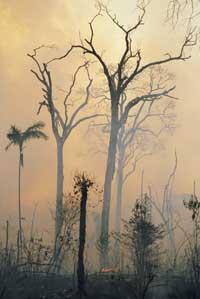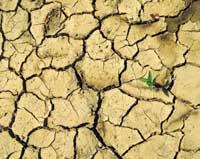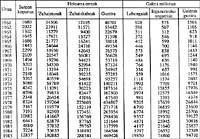Wildfires, annual event
2000/09/10 Kortabarria Olabarria, Beñardo - Elhuyar Zientzia

According to data collected by Greenpeace, the current situation of forests in the world is worrying. Notice what these data say:
- Half of the Earth's forests have disappeared. 60% of the surviving forests are in very poor condition.
- Only 6% of the world's forests are protected.
- 90% of animal and plant life depends on forests.
- If only 10% of the forests are protected, half of the Earth's animals and plants will disappear.
- Deforestation causes more than 50,000 species to disappear each year.
- Every year 13 million hectares are lost in tropical forests. The greatest destruction has occurred in the last 30 years.
- 75% of the world's forests are in the Amazon, Russia and Canada. If the rate of deforestation continues, 75% of these forests will be lost in the next 5-10 years.
- One in five trees is sick.
- In case of fires, forests themselves become environmental problems. In 1997 and 1998, for example, in the fires that occurred in Indonesia, large amounts of CO2 were emitted into the atmosphere, like coal, oil and gas burned in Europe in a year.
There are cooler, warmer data on the damage caused by fires in the Autonomous Community of the Basque Country in recent years and in Navarre last year:
| 1999 | 1998 | ||
| ALAVA | Number of fires Burned hectares | Information 85.7 | Services 195,29 |
| BIZKAIA | Number of fires Burned hectares | Library 300,60 | News 343,00 |
| GIPUZKOA | Number of fires Burned hectares | Services 112,60 | Services 969.60 |
| NAVARRA | Number of fires Burned hectares | Services 536,70 | - - |

It can be thought that, in general, summer and autumn are the ideal times for forest fires, since, on the one hand, the land is drier than ever, and on the other, more people are concentrated on the mountain than usual -which ignites the fire without taking the necessary measures. In Gipuzkoa and Bizkaia, however, most fires occur in autumn and winter. On the other hand, in the forest and in agriculture in general no other work is done, so in the forest soil numerous dead plants accumulate, conifers proliferate… and all this facilitates the propagation of the fire. Intrigues of builders, the wood market and simply desire to collect insurance do not close the way to fires.
Better remedy than no fire
For Greenpeace, the real solution to fires is that the principle of prevention does not occur. According to the environmental organization, the evaluation of forest fires must go beyond the computation of affected livestock and burned hectares, as well as the ecological interest of affected fauna and the barbecue. According to Greenpeace, what forest fires really question is the dynamics and continuity of the lifestyle that wants to move to the rhythm of Nature. According to environmentalists, the fires are due to a series of events that are always repeated:
- In recent years large infrastructures have multiplied - highways, dams…-. Therefore, the populations have been emptied, the nearby forests are not served by anyone, the rivers and streams have dried up… and the risk of fires has increased.
- As forests are no longer exploited, forest biomass – dirty forests, shrubs, fallen branches – increases and the risk of fire increases.
- Very fire sensitive species are being used to replant forests, especially conifers.
- Companies that live in charge of fires invest a lot. Then, of course, they will have to make them profitable.
In the field of fire prevention, Greenpeace has listed the problem of forest fires:
- Despite the reduction of fire risk, it is necessary to develop forest management models that guarantee the development of forest ecosystems.
- We must seek the balance between conservation and production, performing tasks with a specific objective.
- Properly develop revegetation programs.
- Control the market of burnt wood to combat speculation.
- It is mandatory to recover the burnt mountains.
- Rational use of the mountain and forest.
- Prohibition of reserves in forest areas.
- Increase investments in prevention.
- Control of industries responsible for firefighting and forest revegetation so that their economic benefits are not directly related to increased fires.
- Participation of the Administration in the judicial processes of opening by fires.
What can you do?
In addition to what institutions and people working on forestry have to do, you also have to work to reduce forest fires:
- We are in summer, in the driest season. Therefore, do not light bonfires in forest areas.
- Smoking harms health and if the cigarette does not turn off properly or is thrown out without turning off matches, it will also harm the forestHe says.

- Run carefully if you have to make bushes or burns and don't make the days of wind fire.
- If you go to the mountain or forest do not leave garbage there. For the next one who comes to the place is aesthetically ugly, it can damage the environment and promote the spread of the fire in case of fire. The fact that the forest is dirty does not benefit at all.
- Although it is customary at the feasts of our village, do not throw the rockets in places where the fire can spread.
Despite its correct performance a fire can occur. If you catch yourself in the area, follow these tips:
- First, before you play quietly and do what you have to do, think twice.
- If the fire is not very intense, try to turn it off.
- If you are using water to turn off the fire, throw it under the flame.
- If you don't have water, but still think you can do something to extinguish the fire, take in the surroundings some green branch.
- Before the fire is too big, think about the escape and leave the road safer. Once this is done, try to call the firefighters.
- If the fire has surprised you, do not enter the vaguadas, if it is possible to locate some stream or well and enter it, or lie it hidden between the rocks, and do not pass between the flames if you do not see what is behind.
- If someone's clothing burns, don't let it run: throw it to the ground, spin it or cover it with whoever you can.
Published in 7

Gai honi buruzko eduki gehiago
Elhuyarrek garatutako teknologia





